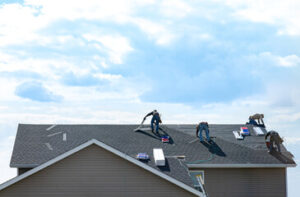Roofing Experts have the expertise to deal with many of the issues that may arise. They’re familiar with different state regulations and can ensure that the reroofing process is up to code.

Safety – Working on your roof can be hazardous, with tons of accidents reported each year. An expert team will be able to complete the work in a safe and timely manner.
A roof is an essential part of any building, and it needs to be properly maintained. However, working on a roof can be hazardous for those who are not trained or have the proper equipment. Hiring a roofing expert will ensure that the job is completed safely and correctly. In addition to implementing safety measures, they can also provide liability insurance that will protect you in the event of an accident.
The first step in ensuring the safety of roofing workers is to provide them with appropriate personal protective equipment (PPE). This includes hard hats, goggles, and non-slip shoes. It is also important to regularly inspect and replace worn gear. Moreover, roofing experts should ensure that their work area is clear of debris and tools, as these can cause tripping hazards. They should also be familiar with all electrical hazards, including power lines and other equipment, and be sure to keep their tools away from them.
It is also critical to train roofing contractors on how to recognize potential hazards, such as leaking gutters or missing shingles. This training can help them avoid dangerous situations and save lives. In addition, they should be familiar with the industry ladder safety standards and how to use them safely. Ladders should be inspected and selected based on their height requirements and weight capacity.
Lastly, roofing contractors should have an emergency action plan (EAP) in place to prevent accidents on the job site. This should include the site’s street address and details of what to do in case of an accident. It should also include a contact person who can alert 911 staff when necessary.
A comprehensive EAP should also include a review of the work area and a list of all hazards. This should be reviewed regularly by both the homeowner and roofing contractor to ensure that all hazards are identified and corrected. Using a digital checklist, like SafetyCulture, can make this process more efficient by allowing both parties to conduct inspections remotely and instantly identify potential hazards. In addition, it can also be used to share best practices and reinforce safety guidelines.
Time
When you choose to use a roofing expert, they will take the time to visit your home and conduct a thorough inspection of your roof. This includes checking for damage, leaks, and other issues. They will also ask you about your preferences for materials and styles, so that they can recommend a roofing solution that best matches your vision for your home. A roofing specialist will also be able to accurately estimate the amount of time that the project will take, so that you can plan accordingly. They will also be able to provide you with a warranty for their work.
Warranties
Roofing warranties are an important part of the purchase process. They can provide homeowners with peace of mind and a measure of the contractor’s commitment to quality work. However, it is important to understand the terms of a warranty before making a decision. For example, some contractors advertise “lifetime warranties” when the truth is that they only include a labor warranty that ranges from 2 to 10 years depending on the contractor. Similarly, some manufacturers offer “labor-only” warranties that only cover the cost of labor to replace a roof, but not the actual materials themselves.
A good roofing expert will be transparent about the length and details of their warranty policies. They will also be able to recommend the best warranty for your home’s unique needs. In addition, a knowledgeable roofing expert can answer any questions you may have about a manufacturer or workmanship warranty, helping you make an informed choice.
Manufacturer and workmanship warranties are the most common types of warranties available for residential roofing systems. A manufacturer’s material warranty protects against defects or flaws inherent in the products, while a contractor’s workmanship warranty covers installation errors that could lead to leaks or other issues. Combined, these warranties can provide comprehensive protection for the entire roof system.
Extended warranty coverage is also available from many manufacturers and can be purchased in conjunction with a standard manufacturer or workmanship warranty. These warranties can be particularly beneficial for older buildings that are reaching the end of their design life, as they can provide coverage beyond the lifespan of the structure.
Depending on the nature of the roof, some warranties also offer prorated or full-coverage options. Prorated coverage reduces the coverage amount to zero percent at the end of a designated period, while full-coverage warranties can provide replacement value up to the established policy limit.
It is important to be aware of these limitations and exclusions when considering a roofing warranty. It is also advisable to review the terms of the warranty carefully before filing a claim to ensure that it is processed correctly and in accordance with the terms of the contract. For example, it is important to document any issues you encounter with your roof and take photos or videos for documentation purposes. This will help expedite the claims process and prevent any confusion or disputes.